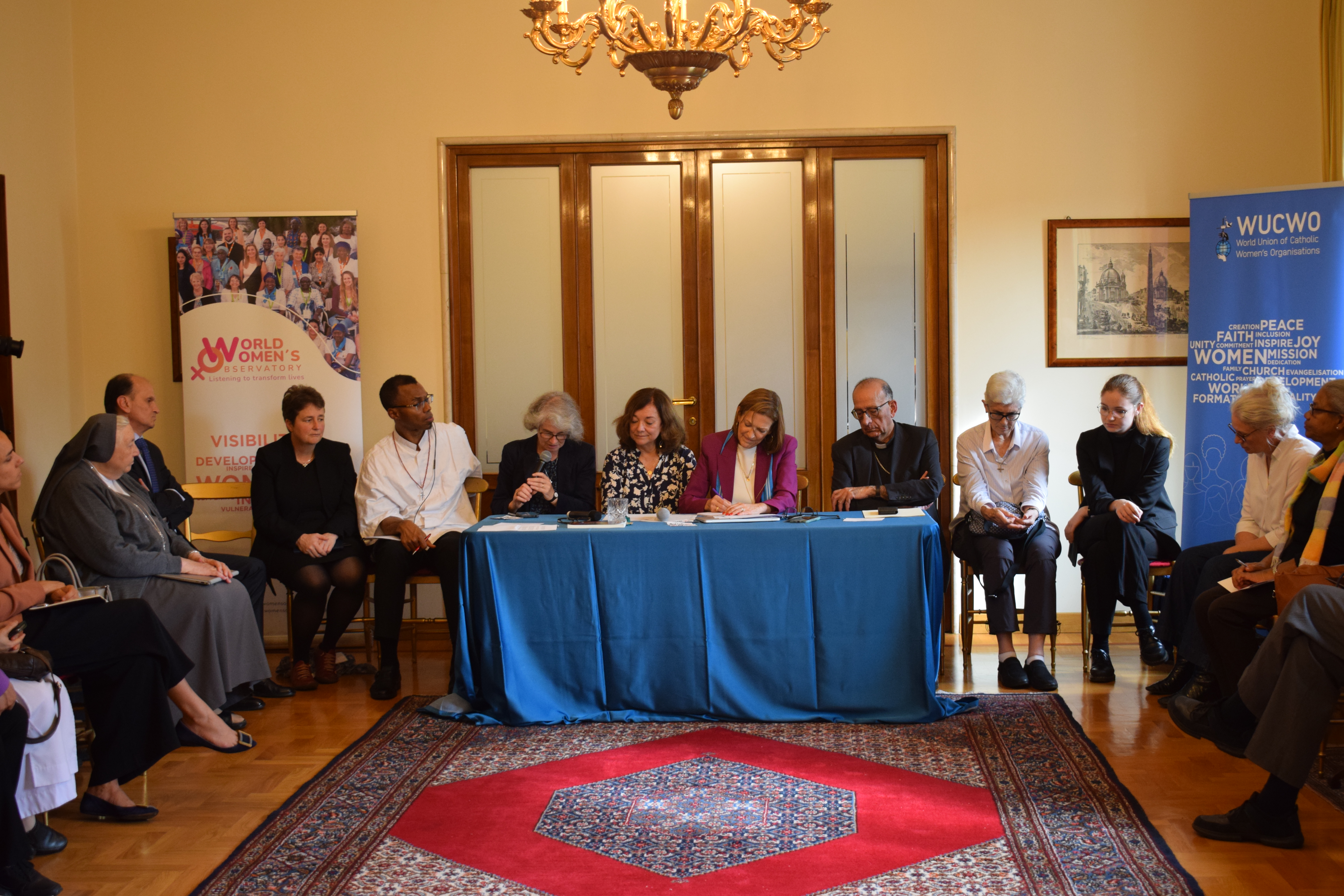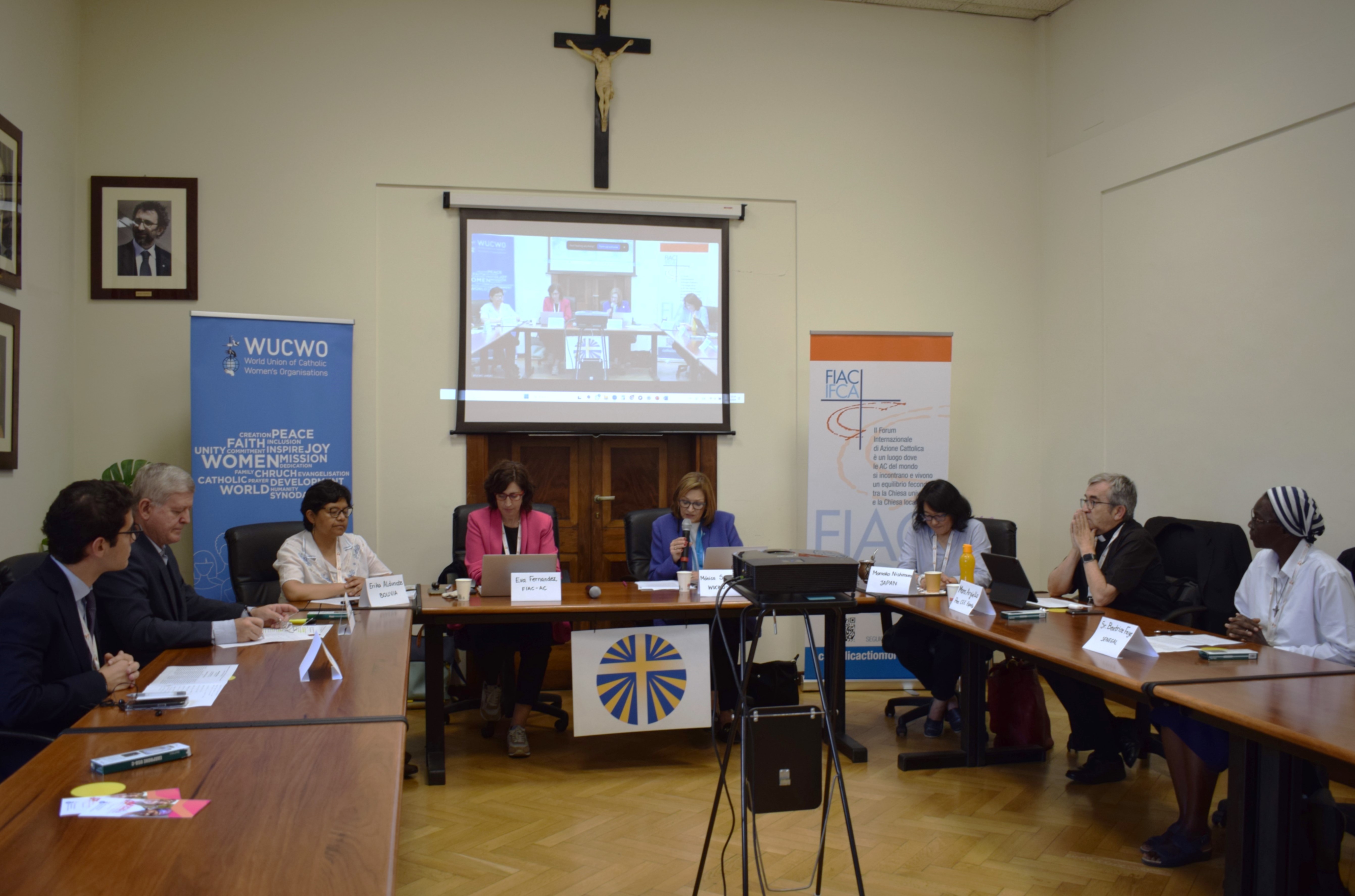+39 0669887260 | info@wucwo.org | Contact us
School for Synodality
What can we expect from the Synod?
"The problems of today's world call for new solutions and the Church must be prepared to offer them at all levels. For this, it must have the valuable and essential, full and co-responsible collaboration of more than half of its members: women."
On 17 and 24 October, the World Union of Catholic Women's Organisations (WUCWO) organised two events in the context of the 16th Ordinary General Assembly of the Synod of Bishops, as part of the ‘WUCWO’s School of Synodality’. Both meetings brought together several participants of the Synodal Assembly to share their reflections and experiences over the past two years, as well as some proposals for the future. 527 people from more than 50 countries participated in the two events, which were live streamed in 4 languages. These global meetings allow the synodality of the global Church to be lived also at the local level, bringing the synodal process and Assembly closer to the grassroots communities.
Looking to the future: Women in a Synodal Church
The event on 24 October focused on the future of the synodal Church, with a particular focus on the role of women. Speakers reflected on what it has meant for them to participate in the Synod and highlighted the changes needed for women to fully assume their mission in this new synodal Church in mission.
Monica Santamarina, WUCWO President General, highlighted (Complete discourse here): ‘There is so much to do to bring God's love to our brothers and sisters in this world which, as Pope Francis mentions in his recent Encyclical “Dilexit nos”, seems to have lost its heart. So many people are suffering from violence, abandonment, hopelessness and poverty [...] The problems of today's world call for new solutions, and the Church must be prepared to offer them at all levels. To do so, it must have the valuable and essential full and co-responsible collaboration of more than half of its members: women’.
Among the participants were Cardinal Juan José Omella (Spain), Julia Oseka (Poland/USA), María de los Dolores Palencia (Mexico), Fr Agbonkhianmeghe E. Orobator (Nigeria), Claire Jonard (Belgium), Sr Yvonne Reungoat (France), and Avril Baigent (UK). They shared their reflections on how synodality is taking shape in different cultural and local contexts, underlining the active role of women and youth in this process. Sister Natalie Becquart, Under-Secretary of the General Secretariat of the Synod, also participated.
Yvonne Reungoat, expert and facilitator at the Synodal Assembly, underlined ‘Women have empathy, closeness, and so much more. It would be important for them to be more visible, not to have more power, but to pass on their gifts to others’.
Julia Oseka, the youngest synod mother, 23, a student of physics and theology in the United States and originally from Poland, spoke about women's participation in church ministries: ‘When I think about women's participation, I think it is dangerous to consider the female diaconate just because there are areas without priests. That objectifies women. One of the highlights of this Synod on women's co-responsibility is to recognise their dignity [...] It is important that the Church speaks and dialogues with women, not about women.’
Nathalie Becquart told us: ‘One of the most important things about this synod is that women have become more and more empowered to speak, to give their opinion and to contribute their input... The closer we get to a synodal Church, the more united we will all be in mission.
The fruits of this Synod, discussed at the Assembly, are already beginning to be implemented at the local level in parishes in different countries. The WUCWO School of Synodality has been a fundamental tool in this process. In fact, it has trained 253 synod facilitators, many of whom, in their respective countries, have promoted encounters using the ‘conversation in the Spirit’ method.
Are there signs of hope in the synodal journey?
The event on 17 October was organised by WUCWO with the International Forum of Catholic Action (IFCA) and the collaboration of the Azione Cattolica Italiana. It was moderated by Monica Santamarina and Eva Fernandez, president of the ICAF.
Mons. Luis Argüello (Spain), Momoko Nishimura (Japan), Sr Anne Beatrice Faye (Senegal), Fr. Ernesto Sánchez (Mexico), Erika Aldunate (Bolivia) and Tommaso Cappelli (Italy).
Momoko Nishimura explained that, when she returned to Japan after the first session of the Assembly, she found many people interested in learning more about the Synod, the conversations in the Spirit and how to implement them in their parishes: ‘The best thing is to listen to each other as equals’.
On the other hand, Erika Aldunate stressed: ‘The Pope asks women to speak without fear. When I mentioned this in the parishes, women came up to me and shared their painful stories. They have a lot to tell.’
These gatherings reflect WUCWO's commitment to foster reflection, formation and dialogue on synodality in the Church. Both events provided a space to listen to diverse voices, from different continents, and to discern together the way towards a more inclusive, participatory Church, closer to contemporary realities.

